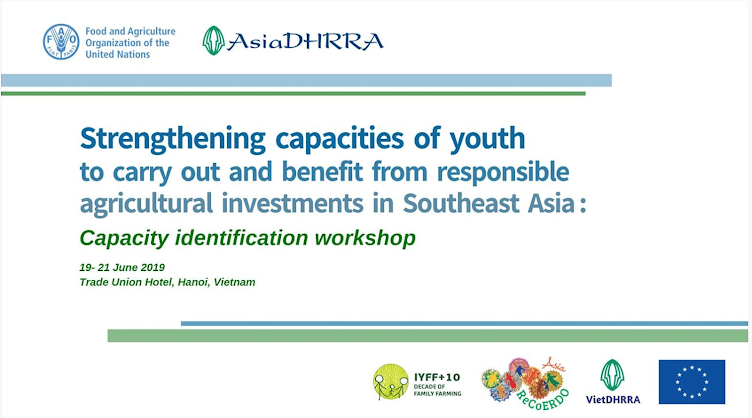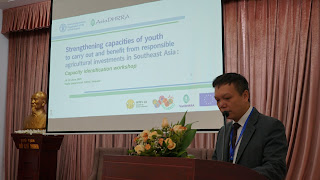The workshop opened with welcome messages from FAO, AsiaDHRRA and the
Vietnam government, followed by a group photo and the introduction of the
workshop participants.
Welcome Message by Mr. Nguyen Song Ha, Assistant FAO
Representative (Programme), Officer-in-Charge, FAO Viet Nam
Mr. Ha emphasized the role that investments in agriculture play in the
eradication of hunger and poverty and importance that these investments are
“responsible.” Mr. Ha also reiterated the commitment of FAO to promote
responsible agricultural investments through the Principles for Responsible Investment in Agriculture and Food Systems
(CFS-RAI) in the light of vast amount of investments coming into the Southeast
Asian region. He also discussed the importance of empowering the youth to
engage in agricultural activities to create livelihood opportunities, achieve
food security and stimulate economic growth in the CLMV region. He mentioned that key challenges that need to
be addressed include limited access to land and credit.
Welcome Message by Dr. Nguyen Xuan Hong, AsiaDHRRA
Chairperson
Dr. Hong thanked FAO for giving AsiaDHRRA the opportunity to be part of
the first discussion of CFS-RAI in the Southeast Asian region. He also expressed agreement with the call for
an increase in investment in agriculture but also cautioned that these
investments should result in the “3Ps”
or triple bottom line -- that investments not only produce Profit but also benefit the People (the rural poor in particular)
and protect the Planet. Dr. Hong
also issued the challenge among the participants to address the need to get
more young people engaged in agriculture and to have more “investments for the
youth, and by the youth.”
Opening Remarks by Dr. Nguyen Nhu Cuong, Acting
Director, Crop Production Department, Ministry of Agriculture and Rural
Development
Dr. Cuong described the agriculture sector of Viet Nam as not yet
significant in terms of share in GDP as it accounts for only around 15% of the
country’s GDP. However, he noted that the
impact of the agriculture sector to the country is “deep” as it employs almost
48% of the population and affects almost everybody. It is for this reason that the government of
Viet Nam places significant attention and support to the agriculture sector. Dr. Cuong mentioned that Viet Nam has various
policies on attracting direct foreign investments in agriculture, including a
decree on bank credit for the agriculture sector. He also mentioned that the government has a
program for sending technical experts to Japan for training on the latest
agricultural techniques and technologies.
He also expressed agreement with the importance of attracting the young
college graduates to work in the agriculture sector. He
mentions that the Minister for Agriculture has emphasized the need to expose
students to agriculture enterprises. He
also said that the government is targeting the establishment of 15,000
cooperatives by 2020.



